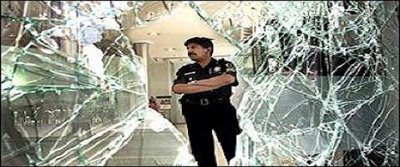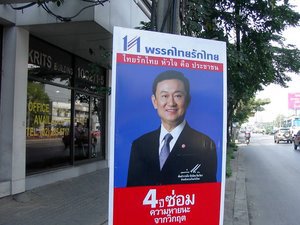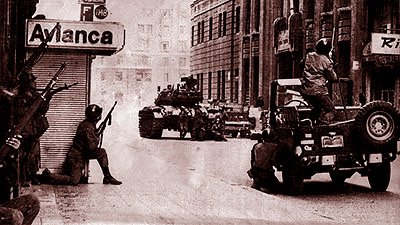Sunday, November 27
11/27/2005 11:40:00 AM
Changing of the old guard ...
Would there be any chance in the foreseeable future that there would be a change of government in Singapore? An examination of some key factors behind the fall of any politcal party would give us a clue to the sustainability of PAP’s rule in Singapore.
1. Disillusionment with the government.
It’s worth noting that any government must keep the faith of the people intact. The role of the government is a simple one: to ensure that there’s peace, progress, development, and the multiplying of wealth within the nation itself. (Bread and butter issues) Failure to do so would only incur the frustration, disillusionment of the masses and this would set the motion of change in place and the eventually downfall of the government is inevitable.

The Great Depression of 1929 made Hitler possible. Without the experience of poverty, the humiliation of Germany, and the upheaval of a total economic meltdown, Hitler would not have rose to power on a wave of popular discontent with the Weimar Republic led by Gustav Stresemann. The German people realized that the Weimar republic could not solve their problems and offer them what they needed, thus the look for an alternative began and ended with the election of Hitler into government. In short, the Weimar Republic had lost all forms of credibility in the eyes of the majority of Germans and it’s time to initiate changes.

Similarly, in Argentina in 2001, we see the effect of a disillusioned populace in initiating the changing of the guard not once but 4 times in a matter of months. The cause of the people’s grievances stemmed from the inability of the government to prevent Argentina from defaulting on its debts, leading eventually to an economic crisis. Confrontations between the police and citizens became a common sight, and fires were also set on Buenos Aires avenues. The violent protests of December 20 and 21, 2001 in Plaza de Mayo, where demonstrators clashed with the police, ended with several dead, and precipitated the fall of the government. President Fernando de la Rúa fled the Casa Rosada in a helicopter on December 21.
2. A Credible Opposition

Sometimes, the only way that there could be changes in the leadership of the nation depends on the opposition themselves. If the opposition is able to potray itself as being better than the ruling party and convince the masses that life would be better under the opposition, then in this case, the opposition stands a great chance in toppling the ruling party.

The way to go about doing this is to present sound arguments which question the ruling party’s ability to run the country. In such a scernario, the ruling party would be answerable to the people and failure to do so, would incur the warth of the people that brought them to power in the 1st place. A look at Thai Rak Thai led by Thaksin in the Thai parliamentary elections of 2001, PAS in Kelantan and Terengganu in the GE of 2001, the British Labour party in 2001, The Republicans led by Bush in 2000, and more recently in Poland this year would more than justify the fact that any party with capable, honest leaders, well-oiled politcal machinery and most important of all, a credible and justifiable challenge to the ruling party could derail the ruling party from power.
Why Thaksin succeeds?
3. Allegiance of the military
Mao Zedong once remarked, “ Power comes out of the barrel of the gun.”
For this instance, the facts will bring across the message that the military is the passport to power.
1936: Part of the army seizes control of parts of Spain commencing the Spanish Civil War. Later General Francisco Franco assumes control of the country.
1937: Brazilian president Getúlio Vargas, governating democratically until then, launches a self-coup and becomes the Dictator of Brazilian Estado Novo.
1943: Military coup in Argentina leads to the ascent of extremely popular President Juan Perón.
1958: Military coup in Pakistan. Army Chief and Defence Minister Gen. Ayub Khan overthrows the government of Iskander Mirza and becomes President after a winning a rigged referendum.
1973: Military coup in Chile. The democratically elected Marxist president Salvador Allende is replaced by the military dictatorship of Augusto Pinochet.

1999: Military coup in Pakistan. Army refuses to obey Prime Minister Nawaz Sharif's government. General Pervez Musharraf becomes dictator (with the title "Chief Executive") and exiles Nawaz Sharif to Saudi Arabia.
2005: Military coup in Mauritania overthrows president Maaouya Ould Sid'Ahmed Taya, who came to power after a coup, in 1984.
Thus, in a nutshell, it is highly impossible that the PAP will lose power any time soon. Their stranghold on power would not be very much affected by the weak and ineffectual opposition in Singapore. As long as Singapore doesn't plunges into an unprecedented economic collapse (remember the PAP lost the most number of seats during the 1997 GE; the year of the Asian Financial crisis) where the livelihood of every Singaporeans is affected on a widespread and lasting scale, the PAP will contiune as the paramount and supreme leader of Singapore, unless of course the military decides to take things into thier own hands.
*The motion of a revolution is in place. A change is now very much inevitable !
One day, we will rise !
1. Disillusionment with the government.
It’s worth noting that any government must keep the faith of the people intact. The role of the government is a simple one: to ensure that there’s peace, progress, development, and the multiplying of wealth within the nation itself. (Bread and butter issues) Failure to do so would only incur the frustration, disillusionment of the masses and this would set the motion of change in place and the eventually downfall of the government is inevitable.

The Great Depression of 1929 made Hitler possible. Without the experience of poverty, the humiliation of Germany, and the upheaval of a total economic meltdown, Hitler would not have rose to power on a wave of popular discontent with the Weimar Republic led by Gustav Stresemann. The German people realized that the Weimar republic could not solve their problems and offer them what they needed, thus the look for an alternative began and ended with the election of Hitler into government. In short, the Weimar Republic had lost all forms of credibility in the eyes of the majority of Germans and it’s time to initiate changes.

Similarly, in Argentina in 2001, we see the effect of a disillusioned populace in initiating the changing of the guard not once but 4 times in a matter of months. The cause of the people’s grievances stemmed from the inability of the government to prevent Argentina from defaulting on its debts, leading eventually to an economic crisis. Confrontations between the police and citizens became a common sight, and fires were also set on Buenos Aires avenues. The violent protests of December 20 and 21, 2001 in Plaza de Mayo, where demonstrators clashed with the police, ended with several dead, and precipitated the fall of the government. President Fernando de la Rúa fled the Casa Rosada in a helicopter on December 21.
2. A Credible Opposition

Sometimes, the only way that there could be changes in the leadership of the nation depends on the opposition themselves. If the opposition is able to potray itself as being better than the ruling party and convince the masses that life would be better under the opposition, then in this case, the opposition stands a great chance in toppling the ruling party.

The way to go about doing this is to present sound arguments which question the ruling party’s ability to run the country. In such a scernario, the ruling party would be answerable to the people and failure to do so, would incur the warth of the people that brought them to power in the 1st place. A look at Thai Rak Thai led by Thaksin in the Thai parliamentary elections of 2001, PAS in Kelantan and Terengganu in the GE of 2001, the British Labour party in 2001, The Republicans led by Bush in 2000, and more recently in Poland this year would more than justify the fact that any party with capable, honest leaders, well-oiled politcal machinery and most important of all, a credible and justifiable challenge to the ruling party could derail the ruling party from power.
Why Thaksin succeeds?
3. Allegiance of the military
Mao Zedong once remarked, “ Power comes out of the barrel of the gun.”
For this instance, the facts will bring across the message that the military is the passport to power.
1936: Part of the army seizes control of parts of Spain commencing the Spanish Civil War. Later General Francisco Franco assumes control of the country.
1937: Brazilian president Getúlio Vargas, governating democratically until then, launches a self-coup and becomes the Dictator of Brazilian Estado Novo.
1943: Military coup in Argentina leads to the ascent of extremely popular President Juan Perón.
1958: Military coup in Pakistan. Army Chief and Defence Minister Gen. Ayub Khan overthrows the government of Iskander Mirza and becomes President after a winning a rigged referendum.
1973: Military coup in Chile. The democratically elected Marxist president Salvador Allende is replaced by the military dictatorship of Augusto Pinochet.

1999: Military coup in Pakistan. Army refuses to obey Prime Minister Nawaz Sharif's government. General Pervez Musharraf becomes dictator (with the title "Chief Executive") and exiles Nawaz Sharif to Saudi Arabia.
2005: Military coup in Mauritania overthrows president Maaouya Ould Sid'Ahmed Taya, who came to power after a coup, in 1984.
Thus, in a nutshell, it is highly impossible that the PAP will lose power any time soon. Their stranghold on power would not be very much affected by the weak and ineffectual opposition in Singapore. As long as Singapore doesn't plunges into an unprecedented economic collapse (remember the PAP lost the most number of seats during the 1997 GE; the year of the Asian Financial crisis) where the livelihood of every Singaporeans is affected on a widespread and lasting scale, the PAP will contiune as the paramount and supreme leader of Singapore, unless of course the military decides to take things into thier own hands.
*The motion of a revolution is in place. A change is now very much inevitable !
One day, we will rise !
Comments:
Post a Comment